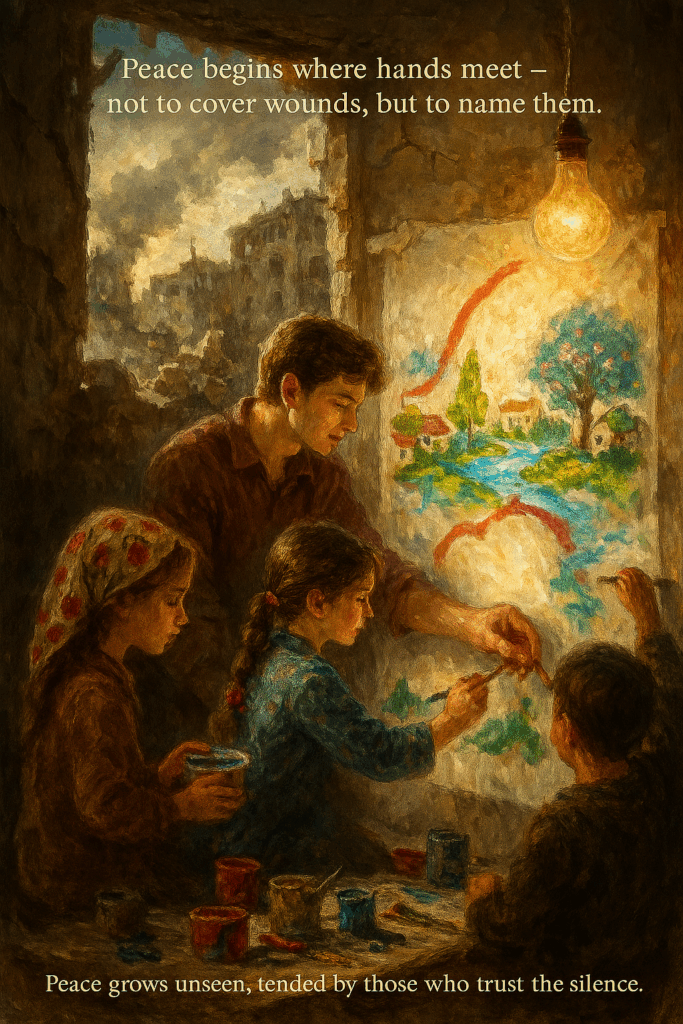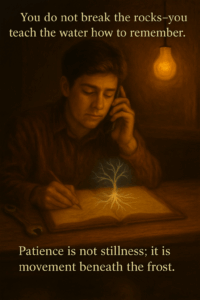
The plane slid beneath a ceiling of low clouds and broke into a morning the color of ash and lemon. Frost clung to the runway in seams. From the oval window, Emil saw rooftops like missing teeth, cranes stalled over skeletal frames, and the thin thread of a river glinting as if it had learned to breathe through winter.
They moved through arrivals in a quiet choreography—Aisha with the mural tube strapped across her back, Jaden steering the crate marked CANOPY PARTS, Priya guarding a backpack of hard drives, Mina holding the sealed envelopes of Crestview slips as if carrying a bowl of water, and Olena walking point, the language a steady bridge on her tongue.
At the exit, a man lifted a hand in a hesitant wave. He had the posture of someone who had practiced standing straight for others—military once, perhaps, or simply a father who’d learned to absorb the weather. He hugged Olena with the restraint of relief.
“My cousin, Taras,” she said. “He’s the one who called Sofia—the teacher at the shelter.”
Taras studied the group with tired kindness. “You traveled far,” he said in accented English. “Here, we travel in circles sometimes. You will need patience.” He nodded toward their crates. “And wheels.”
The van smelled of diesel and wool. They drove past peeled posters, windows armored with plywood, and a school playground where swings hung like unanswered questions. At a corner stall, a woman sold loaves that steamed in the cold. On a wall, a child’s chalk drawing—house, sun, stick figures—had been smudged by snow and turned into a watercolor of something that still tried to be a home.
“Air-raid app,” Taras said, tapping his phone. “If it sounds, we go down.”
The shelter was a former cultural hall, its façade cracked but steadfast. Inside, the floors were clean, the paint fresh in patches, and strings of paper cranes looped along a wall. A generator thrummed like a low prayer. Someone had set a kettle on a hotplate; steam fogged the windows. The air held the iron scent of tools, the sweetness of soup, and something older—a patience that was not resignation.
Sofia met them near the stage—early thirties, hair tied back, the kind of gaze that weighed words before giving them permission to exist. “You’re young,” she said, not unkindly. “That can be good. Or difficult.” Her eyes rested on the mural tube. “Art will not fix a roof. But it can keep a ceiling from falling inside a child.”
Aisha nodded. “We don’t paint over grief. We paint a place beside it.”
Sofia’s mouth softened at the edges. “Then we’ll try.”
They unloaded methodically. Jaden assembled the canopy frame in a corner of the hall—metal ribs rising like a modest cathedral. Priya located outlets, tested voltage through a surge protector, and mapped where data could be safely stored. Mina found a small alcove near a repaired window and set the quiet box there, placing a stack of fresh slips and two pens tied with yarn. Aisha and Olena unfurled the mural draft: a bridge of mended beams crossing a field of reclaimed roofs, a thin river running beneath it like thread.
Children gathered at a distance: two boys trading a rubber ball, a girl with braids wrapped in a scarf patterned with pomegranates, a taller teen with guarded eyes and paint on his sleeves as if from a life paused mid-stroke. The teen leaned against the doorframe, watching.
“We begin with listening,” Emil said softly. He held up the ledger and touched its spine, as if introducing a friend. “We’ll earn the wall after we earn your words.”
Sofia nodded toward a table. “Tea first. Then words.”
They sat under the canopy as if under leaves. The generator clicked, dimmed, and returned. Taras passed cups. Conversation came in gentle bursts—where they were from, what they carried, why they’d come. When the siren test groaned briefly and fell silent again, the youngest flinched and then pretended she had only turned to look at a bird.
“Is it true,” the taller teen said, “that you think boxes can fix a war?”
Mina answered, careful. “No. We think voices help people remember how to be safe with each other.”
He folded his arms. “Danylo,” he said. “My brother’s name was Andriy.”
Olena translated only what needed translation, letting the rest find its own path. “We’re here to try,” she added, to him and to the room.
The first slips began to appear before the tea cooled. A girl wrote, I miss my window. A boy drew a chimney with smoke that curled into a question mark. An older hand wrote, I dream in two houses. Someone else, a single word: Enough.
Aisha knelt by the mural space and taped a butcher’s sheet to the wall—temporary, noncommittal. “This is only the first note,” she said to the children. “We can erase everything. You’re allowed to try without fear of making a mistake.”
Danylo hovered, expression a map with roads erased.
Emil felt the familiar fear—of clumsiness, of offense—arrive like an unwelcome reporter. He remembered Grandfather by the frozen pond. You do not build the river. You remember where it ran. He breathed, and the fear loosened a notch.
“Let’s map the room,” Priya suggested, opening a spreadsheet and a blank graph beside it. “Not people—feelings. Colors for themes: gold for hope, gray for grief, blue for fear, green for memory. We’ll never show names. Only the weather inside.”
Sofia watched as Mina grouped slips by tone; Aisha sketched swaths on the butcher sheet—no images yet, just aura. The generator hiccuped, then held. Outside, snow began again, soft as ashes.
Jaden finished the canopy and stepped back, testing the sway. “If we string cloth here,” he said, “it will mute the siren a little.”
“Not the siren,” a little boy whispered. “The echo.”
“Even better,” Jaden said. “We’ll make less echo.”
Olena walked the children to the box, one by one, showing how to fold a slip and push it through the slot. Some smiled. One girl scowled and did it anyway. Danylo did not move.
Later, when the hall thinned, Emil found him by the cracked back door, gazing at a blackout-painted window as if it were an old photograph.
“You can tell me not to paint,” Danylo said without looking. “Everyone wants to paint roofs. My brother’s roof was painted. The house still fell.”
“I won’t tell you to paint,” Emil said. “I’ll ask you to show me where the river ran.”
Danylo blinked, and for a second his guard drifted. “What river?”
“The one inside this place,” Emil said, gesturing—not grandly, just enough—toward the hall, the draft on the wall, the box with its small, brave throat. “Where safe used to flow. Where it could again.”
Silence.
“There’s no river in rubble,” Danylo said finally.
“Sometimes it runs under it,” Emil answered. “Sometimes it waits for someone to clear a stone.”
A long breath passed. Danylo reached into his pocket and pulled out a fading red pencil. He walked to the butcher sheet and, with a single steady stroke, drew a narrow crimson line across the pale field Aisha had laid down—thin, almost fragile, but impossible to ignore.
“What does it mean?” A child asked.
“Blood?” someone murmured.
Danylo shook his head. “Path,” he said. “But it hurts.”
Aisha looked at Emil and nodded—no erasing. She pulled a soft brush through watered pigment and followed the line with a translucent band of gold on one side and muted blue on the other, as if honoring the wound with breath on both its banks.
Sofia closed her eyes for a beat. When she opened them, the room felt less like a hall and more like a clearing that had remembered how to be a forest.
The siren did not sound that afternoon. They painted a little. They listened more. The generator stuttered once and failed; the light fell to a hush; hands kept moving anyway. When power returned, the colors appeared as if waking from a deep lake.
At dusk, Taras locked the outer doors. The children left with parents and neighbors, their footsteps careful on the stairs. Danylo paused at the threshold and gave Emil the barest nod—a consent not to be misunderstood.
The Circle gathered under the canopy, the ledger open on the table like a low fire. Emil wrote while the others unrolled sleeping mats and coiled cables like vines around their wrists.
He kept his handwriting calm, as if the page might startle.
Ledger Entry — Arrival in the Rubble
Date: March 2, 2026
Symptom: First contact with Kyiv shelter reveals grief’s depth; trust scarce; systems fragile (power, time, safety).
Disease — The Four Absences (Local Context):
Absence 1 (Exclusion): Outsider suspicion; methods perceived as foreign or naive; language and loss create distance.
Absence 2 (Vengeance): Pain demanding targets; skepticism frames help as intrusion; policy scars linger in tone.
Absence 3 (Dehumanization): Children’s lives reduced to counts and headlines; art asked to “fix” what policy broke.
Absence 4 (Unheard Cry): Private grief hidden beneath public composure; slips reveal windows, chimneys, enough.
Investigator’s Response:
Entered with listening posture; installed quiet box and empathy map; began mural as aura (not image); honored Danylo’s crimson path; tuned canopy to soften echo; used colors to reflect patterns (gold hope, gray grief, blue fear, green memory).
Outcome:
First slips submitted; community teacher (Sofia) engaged; initial mural mark accepted; trust germinating.
Note:
Do not paint over wounds—paint the space they ask for. Flow returns where the hurt is named and given banks.
Night gathered at the eaves. Snow ticked against the windows. The generator wound down to a softer hum, like breathing under blankets. Emil closed the ledger and rested his palm on its cover, feeling, beneath ink and paper, the faintest sensation of water finding a way through stone.
The phone vibrated beside him, the soft glow cutting through the dim light. Grandfather Tomas.
He answered quietly. “We arrived,” he said. “It’s… heavier than I imagined. Children who write of missing windows, a boy who paints pain as a path.”
Grandfather’s voice came warm through the static, like tea poured into cold hands. “You’ve entered the part of the garden where roots touch rock. Remember, when the soil is shallow, growth must go sideways before it can rise.”
Emil leaned back against the wall, closing his eyes. “Sometimes I wonder if listening is enough. If the river can still move under this much debris.”
“The river,” Grandfather said gently, “does not argue with stone—it learns the shape of its resistance. You are not there to break the rocks, Emil. You are there to teach the water how to remember.”
Emil let the words settle, soft and anchoring. “So even waiting is movement?”
“Yes,” said Grandfather. “When done with attention. Patience is not the absence of action—it is the presence of awareness. You’ve cleared the first channel today. Let it run slow.”
Outside, a distant siren sighed and faded. The generator clicked off, leaving the low hum of the city in its place.
“Rest, my boy,” Grandfather said, voice dimming into comfort. “Peace is a gardener’s work—it grows in silence long before it’s seen.”
The call ended. Emil looked at the ledger once more, then at the mural’s faint outline shimmering in the half-light. The crimson line Danylo had drawn glowed like a pulse.
He whispered to the room, “The river remembers.”
And beneath the cracked floor, unseen but sure, the flow continued.


